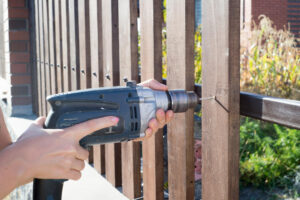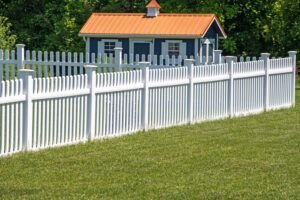Living near the coast has its perks, but it brings challenges too, especially when it comes to keeping your fence in good shape. Humid air, salty breezes, and the occasional tropical storm can wear down even the best-built fences over time. That is why the way your fence is built really matters. A thoughtful residential fence installation does more than look nice—it stands up to the climate and can last much longer with the right care. These straightforward tips will help fences handle tough weather and stay strong through the seasons.
Choose Materials That Work with the Weather
All fence materials are not the same, especially in places where the air stays damp for months. Each material reacts differently to humid weather, so choosing the right one is a big part of long-term fence care.
Wood fences add a classic look to any yard, but without the right sealer or stain, they soak up moisture and wear out early. Extra water can lead to rot or boards warping over time. Vinyl fences resist rot and mildew, making them a solid choice for wet climates, but if they are not installed well, they can sometimes sag, especially when it gets hot. Aluminum fencing is another top pick for the coast since it will not rust and handles salty air much better than plain steel or uncoated iron.
When planning a residential fence installation, think about how the material will react in the local climate. In Brunswick County and surrounding coastal areas, where humidity sticks around and storms roll in heavy, choosing aluminum or specially treated vinyl can help prevent early problems. Picking a fence that fits the weather saves time and trouble later.
Picket and Post offers vinyl, wood, and aluminum fencing, each suited for the unique weather challenges of southeastern North Carolina.
Don’t Let Moisture Win
Rain and humidity do more than just make the air sticky. Over time, moisture can seep into the smallest openings in a fence. Trapped water leads to rot at the base, loosens screws, and can cause paint or protective coatings to peel.
Stopping this starts with small, regular habits. Keep grass trimmed short and clear away debris that builds up along the bottom of the fence. If plants touch the fence, they hold it damp for longer. The same goes for sprinklers that spray the fence daily—turning them away protects wood and vinyl over time.
Watch for signs of water damage. Soft wood, dark stains, or peeling paint all point to trouble spot. If you catch these early, you can seal or patch them before more damage sets in.
Keep Salt in Check
Coastal air brings salt particles that settle on everything outdoors, including your fence. Over weeks and months, that salt starts to wear on paint, stains, and bare metal. For wood or vinyl, salt can dry out the finish and lead to cracks or fading spots. For steel that is not protected with a special finish, rust can show up fast in salty air.
Luckily, rinsing your fence with a hose is an easy way to cut back on salt buildup. After a windy week or storm, a quick rinse helps protect the surface and keeps things cleaner. Try to rinse once a month, and if your property is right by the water, do it even more often.
If the fence feels dusty or the surface looks dull, salt is probably building up. Give it a rinse and check for any spots that may need extra cleaning or a touch-up.
Watch What’s Around Your Fence
What is planted near the fence and what ends up blown against it matters more than you might think. Some plants hold water and press against fence panels, keeping them wet longer. In coastal spots, strong winds send loose items like trash bins, kids’ toys, or branches against the fence, which can chip paint or even crack weaker boards.
Keep nearby landscaping in check. Trim tree branches that reach over or touch the fence, since they can drip moisture or scratch the surface. Wet leaves piled up against a fence often lead to soft spots and mildew.
Sprinklers can cause problems too. When they are spraying the fence every day, the extra water speeds up wear. If possible, reroute them so your panels stay drier.
Plan for Regular Checkups
Fall is a great season for a fence check, especially after a humid summer. The weather eases up, making it easier to spot problems before winter.
Take a close walk around and look for:
– Posts leaning out of line or feeling soft
– Rusty or loose screws and nails
– Boards or panels that have cracks, splits, or dark patches
– Wet mulch or leaves piled along the fence base
When you spot these early, you can fix small problems fast, avoiding bigger hassles later. Set a reminder to check at least twice a year, before and after hurricane season.
Professional fence crews know to look at hidden spots—the bases where posts go into the ground, and where fasteners touch wood or vinyl. Catching a loose post or weak panel before it breaks apart in a storm will always cost less than fixing it after damage has set in.
Picket and Post sets posts deep and uses quality footings on new fences, helping prevent leaning and future rot in Brunswick County’s damp soils.
Make Your Fence Last Longer with Simple Prep
It does not take complex fixes or special tools to protect your fence. Coastal weather brings moisture, wind, and salt, but smart choices and simple habits protect against most trouble.
Choose materials that are built for coastal regions. Keep grass and shrubs trimmed back so your fence can dry out. Rinse the fence if you live close to saltwater. Pay attention to signs of damage and fix them before they get bigger.
When you put the focus on planning and small jobs all year long, your residential fence installation holds up stronger for longer. Good materials and quick cleanups mean your fence will look sharp and work as it should—no matter what the weather brings next.
Noticing signs of wear or thinking ahead about coastal weather damage? Choosing the right fence—and the right support—can make all the difference. We know how Brunswick County’s humidity and salty air can affect your yard, which is why professional help during a residential fence installation can lead to better results that last through every season. At Picket and Post, we’ll help you build a plan that works with your home, your property, and your weather.




